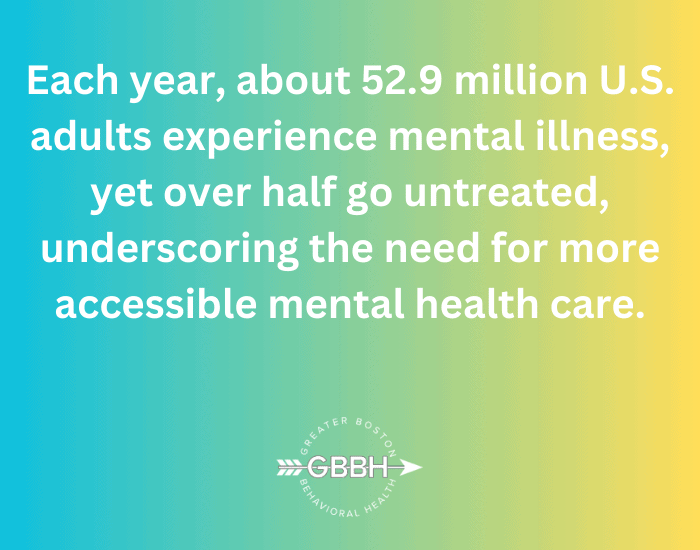Hallucinations can be one of the most disorienting and frightening experiences a person can face, significantly impacting their perception of reality. Understanding the causes, types, and available treatments for hallucinations is crucial for those affected and their loved ones. At Greater Boston Behavioral Health, we provide comprehensive support through our Mental Health Programs designed to help individuals navigate these challenges and reclaim their lives.
What Are Hallucinations?
Hallucinations are sensory experiences that appear real but are created by the mind. They can involve any of the senses: sight, sound, smell, taste, or touch. For example, a person may hear voices that aren’t there or see objects that don’t exist. Hallucinations can vary in intensity and duration, and they often serve as symptoms of underlying mental health conditions, medical disorders, or substance use.
Causes of Hallucinations
Several factors can contribute to the onset of hallucinations, including:
- Mental Health Disorders:
- Schizophrenia: This severe mental health condition is commonly associated with auditory hallucinations, where individuals hear voices that may be critical or commanding.
- Bipolar Disorder: During manic or depressive episodes, individuals may experience hallucinations.
- Severe Depression: In some cases, depression can lead to psychotic symptoms, including hallucinations.
- Substance Use:
- Hallucinogenic drugs such as LSD, psilocybin (magic mushrooms), and certain stimulants can induce hallucinations.
- Withdrawal from substances like alcohol or benzodiazepines can also lead to hallucinations, especially if the withdrawal is severe.
- Medical Conditions:
- Neurological disorders such as Parkinson’s Disease, Alzheimer’s Disease, and multiple sclerosis can produce hallucinations.
- Infections, particularly those affecting the brain (e.g., meningitis), or severe illness can lead to altered mental states and hallucinations.
- Seizures, particularly those originating in the temporal lobe, can produce hallucinations before, during, or after an episode.
- Sleep Deprivation:
- Prolonged lack of sleep can result in hallucinations, with individuals experiencing visual or auditory disturbances that can significantly affect cognitive function.
- Trauma:
- Experiencing trauma, whether physical or emotional, can trigger hallucinations in some individuals, often as part of post-traumatic stress disorder (PTSD).
- Chronic Illness:
- Conditions such as diabetes or liver disease can lead to metabolic disturbances that may result in hallucinations.
Types of Hallucinations
Hallucinations are complex sensory experiences that can vary widely in form and impact. Here’s a closer look at the main types, their characteristics, and possible underlying causes:
Auditory Hallucinations
These are the most common form and involve hearing sounds, such as voices, music, or even everyday noises, that are not actually present. Auditory hallucinations can be benign, but for some individuals, they’re distressing or disruptive. They often occur in conditions like schizophrenia or bipolar disorder, but stress, anxiety, or trauma can also trigger them. In severe cases, the voices may be critical, commanding, or taunting, which can deeply affect an individual’s mental state.
Visual Hallucinations
People experiencing visual hallucinations may see patterns, lights, people, or even entire scenes that aren’t real. This type is often associated with neurological conditions like Parkinson’s disease, Lewy body dementia, or delirium. Visual hallucinations can also occur due to high fevers, prolonged substance use, or extreme fatigue. These hallucinations are sometimes fleeting but can be vivid and long-lasting, making it challenging for individuals to distinguish them from reality.
Olfactory Hallucinations (Phantosmia)
With olfactory hallucinations, people detect smells, often unpleasant, without a real source. Common triggers include brain injuries, migraines, or epilepsy. For example, some individuals might smell smoke or chemicals when none are present. These hallucinations can be particularly confusing, as the individual may believe something in their environment is causing the scent, leading to heightened anxiety or worry.
Gustatory Hallucinations
Less common, gustatory hallucinations involve tasting things that aren’t there, which can range from metallic or bitter flavors to more neutral tastes. These hallucinations may occur in people with epilepsy or other neurological disorders. Gustatory hallucinations can interfere with appetite and lead to food aversions or nutritional challenges.
Tactile Hallucinations
This type involves sensations on the skin, like feeling that something is crawling on or touching the body. Known as formication when associated with the sensation of insects, tactile hallucinations can be especially distressing. They are often seen in cases of stimulant drug use, such as methamphetamine, or during alcohol withdrawal. Tactile hallucinations may also be associated with high-stress environments or extreme fatigue, making sleep and relaxation difficult for those affected.
Despite the widespread occurrence of mental health issues, more than half of adults with a mental illness do not receive treatment. Barriers such as stigma, lack of awareness, cost, and limited access to mental health professionals prevent many from seeking or receiving the help they need. For example, in rural areas and underserved communities, access to mental health treatment remains limited, with few facilities and long waiting times for services. Financial constraints also play a large role, as many insurance plans either don’t cover mental health services or provide limited coverage, leaving patients unable to afford necessary treatment.
When to Seek Help
Hallucinations can be distressing and isolating, impacting day-to-day functioning and overall quality of life. Knowing when to seek professional help is essential for effective treatment and support. Consider reaching out to a mental health professional if:
- Hallucinations Occur Frequently: Persistent hallucinations, regardless of the type, indicate that professional support may be needed to manage or resolve the issue.
- Symptoms Interfere with Daily Life: If hallucinations impact daily routines, work, or relationships, seeking treatment can prevent further disruption and provide relief.
- Accompanying Mental Health Symptoms Appear: Hallucinations often coincide with symptoms of other mental health conditions, such as depression, anxiety, or paranoia. Addressing these concerns holistically improves outcomes.
- Hallucinations Cause Distress or Fear: Experiencing hallucinations can lead to confusion, isolation, or fear. Talking with a mental health provider can help clarify these experiences and reduce distress.
- Physical Health Concerns Are Present: Hallucinations associated with medical issues like neurological disorders or substance use withdrawal require medical intervention and monitoring to ensure safety.
Seeking help promptly can make a significant difference in managing hallucinations and any underlying conditions. At Greater Boston Behavioral Health, our experienced team provides a range of Mental Health Treatment Programs—from Outpatient Mental Health Treatment to intensive support through Intensive Outpatient Programs (IOP) and Partial Hospitalization Programs (PHP). Reach out today to explore options that can help you find relief and regain control over your life.
Treatment Options for Hallucinations
Effective treatment for hallucinations depends on the underlying cause and may involve a combination of therapies, including:
Medication
-
- Antipsychotics: These medications are often prescribed for hallucinations associated with mental health disorders like schizophrenia or severe depression. Common options include risperidone and aripiprazole.
- Mood Stabilizers: For individuals with bipolar disorder, mood stabilizers may be prescribed to help manage mood fluctuations and associated hallucinations.
- Anti-anxiety Medications: In some cases, benzodiazepines may help alleviate anxiety that can accompany hallucinations.
Psychotherapy
-
- Cognitive Behavioral Therapy (CBT): This evidence-based therapy helps individuals understand and manage their hallucinations by addressing distorted thought patterns and reducing their impact on daily life.
- Dialectical Behavior Therapy (DBT): Particularly effective for individuals with emotional regulation challenges, DBT can help those experiencing intense emotions and distressing symptoms.
- Trauma Therapy: For individuals whose hallucinations stem from trauma, specialized therapies focused on processing trauma can be beneficial.
Family Therapy Program
Involving family members in therapy can improve understanding and support for the individual experiencing hallucinations. Family therapy program can create a more supportive home environment and improve communication.
Group Therapy Program
Sharing experiences with others facing similar challenges can provide emotional support and reduce feelings of isolation. Group therapy program settings allow individuals to learn from each other and foster a sense of community.
Outpatient Mental Health Treatment
Structured outpatient programs, including Intensive Outpatient Programs (IOP) and Partial Hospitalization Programs (PHP), offer comprehensive support while allowing individuals to maintain their daily routines. These programs provide therapy and support without requiring overnight stays.
Holistic Approaches
Integrating mindfulness, relaxation techniques, and lifestyle changes can also help individuals manage symptoms and reduce stress. Practices such as yoga, meditation, and nature therapy have shown promise in improving overall well-being.
Conclusion
Understanding hallucinations is essential for those experiencing them and their loved ones. By recognizing the causes and types of hallucinations, individuals can seek appropriate treatment and support. At Greater Boston Behavioral Health, we are committed to providing tailored Mental Health Treatment Programs that address the unique needs of each individual. If you or someone you know is struggling with hallucinations, contact our Mental Health Treatment Center in Massachusetts for compassionate support and comprehensive care. Call us at (888)278-0716 today to learn more about our services and how we can help you on your journey to recovery!
FAQ on Hallucinations
What are hallucinations, and what causes them?
Hallucinations are sensory experiences that appear real but are created by the mind. They can result from mental health disorders, neurological conditions, substance use, trauma, and even medication side effects.
What are the different types of hallucinations?
There are five primary types: auditory (hearing voices or sounds), visual (seeing things that aren’t there), olfactory (smelling scents without a source), gustatory (tasting flavors without eating), and tactile (feeling sensations on the skin). Each type may indicate specific underlying issues and requires tailored treatment.
When should I seek help for hallucinations?
If hallucinations are frequent, interfere with daily life, or cause significant distress, it’s a good idea to seek help. Professional support is essential if hallucinations are paired with other mental health symptoms, like anxiety or depression, or if they arise suddenly without any clear cause.
How are hallucinations treated?
Treatment for hallucinations depends on the cause. Mental health therapies like Cognitive Behavioral Therapy (CBT) or Dialectical Behavioral Therapy (DBT) can be effective, especially when combined with medication if needed. At Greater Boston Behavioral Health, we offer a variety of treatment options, including Intensive Outpatient Programs and Partial Hospitalization Programs, tailored to help manage hallucinations.
Can hallucinations go away on their own?
Some hallucinations may be temporary and disappear without treatment, especially if they’re related to short-term stress or substance use. However, persistent or distressing hallucinations often require professional intervention to address any underlying health issues and provide coping strategies.


